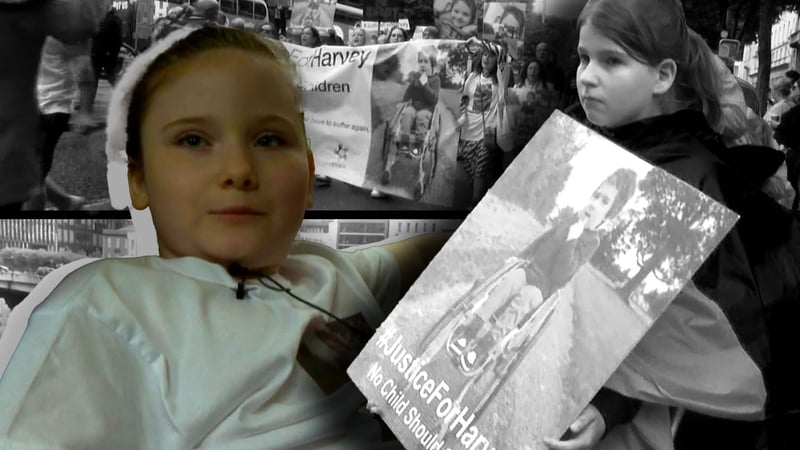
The death of nine-year-old Harvey Morrison last month has reignited scrutiny of scoliosis care in Ireland, particularly for children with complex needs. Families say they have lost trust in the system, despite Government pledges and extra funding.
To understand the perspective of those families, Prime Time spent Saturday meeting some of those heading to a march in Dublin City Centre which was held in Harvey’s memory.
As the rain poured down on hundreds of protesters gathered to march in his memory last Saturday, Harvey Morrison’s mum Gillian was embraced by fellow parents and patients of Children’s Health Ireland (CHI).
“He loved rain. He would have loved this,” she explained to nine-year-old Hannah Keogh who was among those at the Garden of Remembrance in Dublin city centre.
Hannah was pals with Harvey, who died last month. He had spent almost three years waiting to have spinal surgery.
“Maybe he did it, maybe Harvey is raining on us!” Hannah beamed from her wheelchair as the shower passed over the crowd.
Gillian paused before replying softly, “maybe he did.”
Hannah Keogh on her way to the march with her family.
The two children shared the same condition – spina bifida hydrocephalus.
Speaking to Prime Time, Hannah’s dad, Anthony Keogh, recalled how after breaking the news of Harvey’s death to his daughter, she asked if the same thing would happen to her.
“It was the first thing she said – a nine-year-old just shouldn’t be saying something like that,” he said, holding back tears.
“It’s devastating because there’s nothing we can do except plead and ask. You feel helpless.”
Prime Time met Hannah and her family earlier that day at The Square Luas stop, in Tallaght, as they made their way into the march.
Excited, if a little anxious, Hannah smiled and asked our producer if she was going to be famous.
Yet as the tram moved off, a grimace flashed across her face. When the carriage rounded another corner, her arms reached from the wheelchair to grip the yellow, metal Luas handle. Hannah’s body was struggling to stay in a comfortable position as the tram shifted on its journey.
The pain was etched on her face, despite her efforts to hide it.
Hannah associates going to hospital with trauma, so she masks her discomfort to avoid having to go back, according to her dad.
“She knows that ordinarily when she’s in pain we go to Temple Street. She’s so traumatised by it,” Anthony said.
Hannah’s dad Anthony Keogh
After her 26th surgery a number of weeks ago to correct a turn in both legs, Hannah is in a double leg cast and a temporary wheelchair, which her dad says doesn’t properly support her curving back.
Like Harvey, and many other spina bifida patients, she has developed scoliosis – a condition her family feel should have been picked up sooner.
She is still having tests done to make sure she is clinically ready for surgery but having waited a number of months for a urology operation in the past, they have little confidence that the scoliosis surgery will be done quickly.
“I know so many parents and I’ve heard so many of their horror stories,” Anthony explained.
It is a battle families say they’ve been having for years. In 2017, Ombudsman for Children Niall Muldoon warned “young people with scoliosis are suffering severe physical and psychological effects as a result of the delays they experience.”
Then health minister Simon Harris pledged that no child would wait more than four months for surgery. However, despite some improvements to waiting lists that target has yet to be met.
At Saturday’s march there were repeated calls for CHI to be dismantled and replaced
In fact, rather than building confidence in an improving system, a series of recent critical reports have further undermined the relationship between Children’s Health Ireland and families.
CHI controversies
In 2022, concerns emerged over poor outcomes observed following complex spinal surgeries at Temple Street Hospital. There had been a high incidence of complications and infections after surgery.
CHI subsequently became aware that unauthorised devices were used in a small number of spinal surgery procedures.
The implantation of springs in three children was the subject of a HIQA report which described the use as “wrong”.
The review noted that the use of the springs was part of a “well-intentioned but ill-considered effort” adding that CHI Temple Street’s governance arrangements had become increasingly complex and unwieldy.
While one group of children was experiencing serious delays and issues with their operations another was having orthopaedic surgery that may not have been required at all.
An independent audit of operations carried out on children with hip dysplasia between January 2021 to December 2023 concluded that a number of the surgeries were unnecessary.
Coming in the wake of such high-profile inquiries and reports, the death of Harvey Morrison has devastated families with direct experience of spinal and spina bifida services.
His family has said they do not have a cause of death yet.
In a statement to Prime Time, CHI extended its deepest condolences to Harvey’s family and acknowledged that some scoliosis patients are waiting “too long”. It pointed to progress in both waiting times and scoliosis surgery volumes and said the average wait for surgery is now just short of five months.
Harvey’s parents at the march on Saturday.
It noted that progress in previous years had been impacted by Covid-19, the departure of a surgeon in 2021 and the subsequent “extended leave” of the surgeon at the centre of the springs investigation. But it said the rate of operations has increased by 17% over the last year and 13 additional staff have been hired including a new surgeon.
We need your consent to load this flourish contentWe use flourish to manage extra content that can set cookies on your device and collect data about your activity. Please review their details and accept them to load the content.Manage Preferences
At the time of the Ombudsman’s report in 2017 there were 119 children with scoliosis waiting more than six months. At the end of July this year figures indicate there are 38 children waiting in excess of six months.
Outsourcing and gaps
While progress has been made, advocates say some data does not reflect the full picture as it often does not include those being treated abroad or children who have been given dates for their operations but have yet to have a procedure.
“I don’t feel the data is capturing the picture, because if it was, why would we be standing out here today in the rain?” Una Keightley co-founded the Spina Bifida and Hydrocephalus Paediatric Advocacy Group told Prime Time.
There has also been criticism of CHI for not capturing data on how many children have become inoperable while being treated for scoliosis. The opportunity to improve the system is lost, campaign groups say.
CHI told Prime Time that 19 patients have travelled overseas for surgery over the past 18 months adding that families are provided with a support package which includes flights, accommodation and subsistence for two adults to accompany the child. A new tender has been issued to provide further overseas treatment.
However, campaigners contend that outsourcing of operations to other jurisdictions has not worked for children with spina bifida because wrap-around services are not in place.
“If you travel for spinal care, you will be under the spinal team in the country you go to, but you’re not under the other specialities that these children need. So, you’re trying to pick one area of their health to prioritise while not knowing if the other ones would suffer,” Una Keightley said.
It’s not just the campaign groups asking questions. Minister for Health Jennifer Carroll MacNeill has said she is not satisfied with the explanations given as to why an additional €19m in funding had not resulted in a “commensurate increase in surgeries”.
Minister for Health Jennifer Carroll MacNeill.
CHI estimates that it will complete 540 surgeries by the end of this year.
The minister said she was moving to centralise scoliosis surgery lists to ensure consultants could not control or over-influence timing and management of operations.
We need your consent to load this flourish contentWe use flourish to manage extra content that can set cookies on your device and collect data about your activity. Please review their details and accept them to load the content.Manage Preferences
Advocates have voiced doubts over how the new centralised system will differ from the dedicated, multidisciplinary unit set up 18 months ago, arguing that the centralisation of waiting lists is not a new development.
An internal audit is also now under way into the management of waiting lists including scoliosis and other orthopedic surgeries, Minister Carroll MacNeill confirmed.
Many of those still waiting for surgeries have complex needs, campaigners point out. Ireland has among the highest incidence of spina bifida in the world.
“Outsourcing initiatives usually favour a child with no other health complications but they don’t cater for the children that are more complex in medical needs,” Claire Cahill who is co-founder of Scoliosis Advocacy Network told Prime Time.
“Until our most vulnerable children have access to timely care, that’s when we have solved this.”
Some of the parents on Saturday’s march expressed concern about the ongoing oversight of spina bifida patients pointing to recent vacancies on specialist teams. CHI confirmed that an occupational therapist has recently joined the service, and a physiotherapist will take up a post shortly.
Loss of trust
At Saturday’s march there were repeated calls for CHI to be dismantled and replaced.
“I’d like to think change is going to happen but I’m not sure it will,” Anthony Keogh reflected.
The curve on his daughter Hannah’s spine has reached 62 degrees and while final clinical checks are being done on her clinical suitability for surgery, he desperately wants a date for the operation.
“Things need to be proactive, not reactive. If the scoliosis is allowed to progress, not only does the operation become more complex, so does everything else that follows it.”
Reporter Louise Byrne and producer Isabel Perceval’s full report will broadcast on the 28 September edition of Prime Time on RTÉ One and RTÉ Player.





